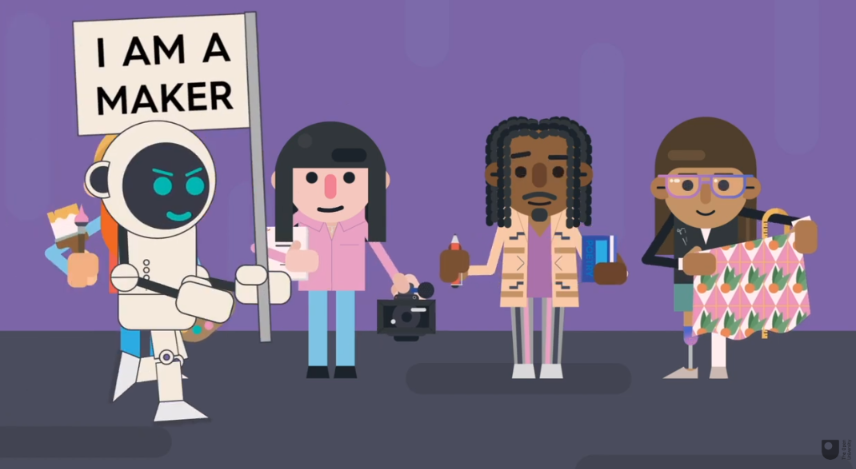One of great debates about artificial evidence at present is whether or not it’s capable of being ‘creative’. Creativity is seen as one of the most important of all human capabilities. It’s the engine of progress, the cradle of culture and the foundation stone for civilization itself. For AI to be able to mirror what humans can do in this area would, it’s argued, mark a very real step towards machines attaining genuine human-like intelligence.
Alongside the technological challenges involved in the development of such capabilities are two issues related much more to the human side of the equation than the machine side. That’s to say, they’re better addressed by the humanities than the sciences. The first of these, which is the focus of the video above, is what exactly we mean by creativity, and how our definition determines the whole question of whether AI is capable of being creative.
The second issue concerns the likely implications that would result from machines learning to behave in creative ways. What impact will this have on our current ways of life? If computers are able to replicate this aspect of our behaviour, does this mean it’s just a matter of time before we’re rendered redundant as far as making any meaningful contribution to civilization goes?
The discussion around issues such as these tends, at the moment at least, to be rather instrumental. The assumption appears to be that if AI can carry out the various tasks we categorise as creative, this robs us of our sense of exceptionalism. Because some other entity is now able to achieve things similar to those that previously we, and we alone, were able to achieve, we’ve become in effect replaceable. And if we’re no longer needed to achieve these things, our sense of value is diminished.
This line of argument is based on two buried assumptions which are, I’d suggest, up for argument.
The first is that a machine being able to replicate, if not excel in, a capability we have means that our own use of this capability is rendered superfluous. The history of artistic creativity suggests rather that it simply means our ambitions and experiments in this field will undergo various changes. The impact that the invention of photography had on fine art is a useful analogy here. Pictorial creativity didn’t cease in the mid-19th century when Fox Talbot and Daguerre pioneered photography. But it did change – and change in radical ways.
The second assumption that underpins the argument is that because machines can do something, there’s no point in us continuing to do that thing ourselves. This would seem to be based on a rather narrow view of the value that creativity has in our lives. As an element of what it means to be human, creativity is as much to do with the process as it is to do with the outcome. It’s an activity that people engage with, and which stimulates their sense of being. The definition of creativity as novel, of value and surprising (used in the video) rather overlooks this aspect of things. It very much focuses on outcomes – on what is produced by the activity. Which is, obviously, a vitally important element of the impact that creativity has on society and civilization. But in terms of the role it plays in what it means to be human, the urge to be creative, and the fulfilment that comes from engaging in creative activity, is also vitally important. This is an issue that’s often downplayed or ignored in discussions of AI and creativity.




Rate and Review
Rate this video
Review this video
Log into OpenLearn to leave reviews and join in the conversation.
Video reviews
gAI is a "plaigarism machine" It takes stolen creative works and semi-randomly regurgitates/amalgamates them into new copies.
Sorry, but stealing copyrighted works isn't democratizing the consumption. Nor is stochastic amalgamation of outputs in lieu of actual artistic effort democratizing the creation.